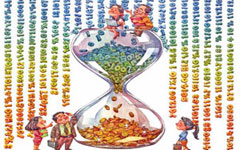Writing history in the age of the Internet
Updated: 2014-04-28 06:35
By Chen Yanru (China Daily)
|
|||||||||||
And the plurality of sources embraced by the Internet is challenging thoughtful historians more severely, asking them just what should go down in history.
If it is hard to make such a decision regarding the record of events, it is even more difficult to determine who should be the heroes and heroines of history. In the past, such figures were known and recorded for their achievements, regardless of whether or not they had obtained sufficient fame and gain to be successful by the worldly standards of today. But the rise and spread of the new media make it possible and plausible for numerous people who have not accomplished much to rise to fame overnight, and their fame may also bring them great wealth, making them "success stories". In other words, the boundary is blurred between heroes and celebrities, achievements and public attention.
|
 |
 |
Yet it should be noted that there is a silver lining in the cloud of information overload and over-recording. At least it helps future historians who might want to unearth some remote secrets about human activities in our age.
However, we should not underestimate the human ability to manipulate information and bias in written records. When we are tempted to think that all events and people are out in the open sphere, the danger is lurking around that skillful social actors may exploit this to project and present socially desirable images and selectively control public attention and mislead opinion. However, this issue is too complicated and must be left to future historians and scholars in other related disciplines.
How is history made? How is history recorded? How is history preserved? How is history to be written? We are more likely to do justice to history in the Internet age if we start pondering such questions.
The author is a professor with the School of Journalism & Communication at Xiamen University. The views do not necessarily reflect those of China Daily.
Related Stories
When big data can lead to big profit 2014-04-21 06:56
China has 3.5 million websites 2014-03-24 13:10
Spread the news - this story will run and run 2014-03-13 15:16
Ten things you need to know about China's Internet 2014-02-28 17:32
500m use mobile Internet 2014-01-16 15:56
Today's Top News
Philippine pact gives US access to air, sea bases
Hunt resumes for bodies inside ferry
Ukrainian mayor wounded by gunfire
Alibaba IPO: Could be the biggest ever
Russia assures US it won't invade Ukraine
Japanese state minister visits Yasukuni shrine
Policeman's fake IDs spur investigations
Driver kills seven in E. China
Hot Topics
Lunar probe , China growth forecasts, Emission rules get tougher, China seen through 'colored lens', International board,
Editor's Picks

|

|

|

|

|

|





